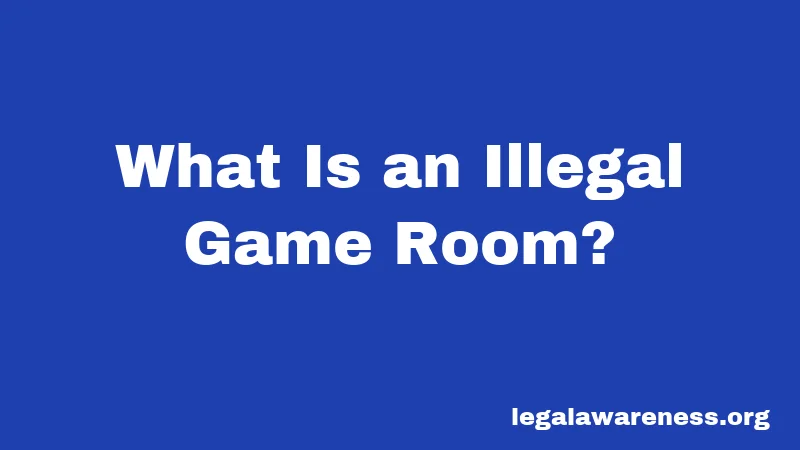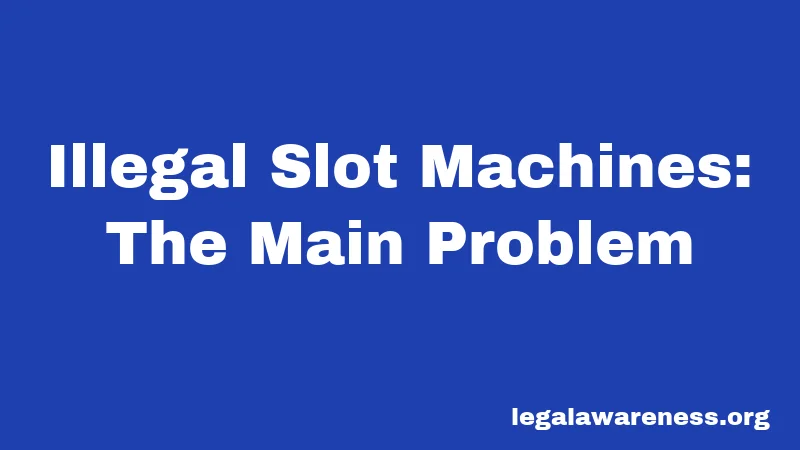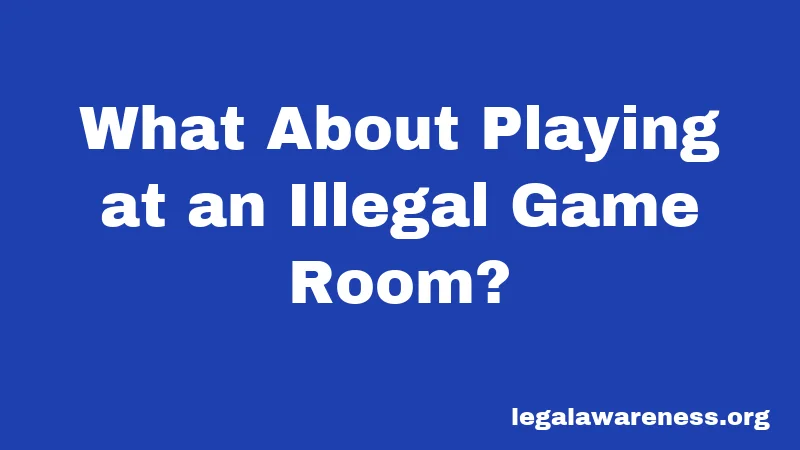Game Room Laws in Florida (2026): The Illegal Arcade Crisis
Most people walk into a game room at a local arcade and assume everything is legal. Wrong. In Florida, the state is cracking down hard on illegal gaming operations. And honestly, the penalties can be serious. Let’s break down exactly what you’re allowed to do, what you’re not, and why the state is so concerned about these businesses.
You might be surprised at how many unlicensed arcades are operating right now. The Florida Gaming Control Commission reports seeing them everywhere. From strip malls to storefronts disguised as casual lounges. Sound complicated? It’s actually not once you understand the basic rules.
What Is an Illegal Game Room?

Here’s the thing about game rooms in Florida. The state has a pretty straightforward definition. If a place offers gaming machines where you can win money, prizes, or store credit (and the machine has any element of chance), it’s probably illegal unless it’s specifically licensed by the state.
These operations go by different names. Adult arcades. Internet cafés. Game lounges. Amusement centers. But they all operate the same way. They have machines that look exactly like slot machines. You play for cash or for vouchers you can trade for money. And that’s where the problem starts.
The Florida Gaming Control Commission is clear on this. “Playing at an illegal arcade may seem like a victimless act, but in reality these businesses are often associated with organized crime, money laundering, fraud, drugs, prostitution, and pose a general risk to the players and communities in which they exist.”
Think of it like this. Legal casinos have rules, inspections, and safety standards. Illegal game rooms have none of that. Zero. The house can change the odds whenever they want. Players who win big sometimes never get paid.
The Basic Rules: What’s Legal
Okay, pause. Read this carefully. Florida does allow some gambling activities. But they’re very specific.
Licensed pari-mutuel facilities in Miami-Dade and Broward Counties can legally operate slot machines. Only eight non-tribal businesses have this license. The Seminole Tribe of Florida also operates licensed casinos with slot machines.
Licensed cardrooms at pari-mutuel facilities can offer poker. Games like Texas Hold ‘Em, Omaha, and Seven-Card Stud are fine. But here’s what matters. You cannot be the dealer and take a cut. Only licensed cardrooms can do that.
There’s also something called “penny ante” games. You might have heard of this. Small games with friends where nobody takes a commission. That’s legal. But the moment an operator starts taking a percentage of the pot, it becomes illegal unless they’re a licensed cardroom.
Not sure what counts as a violation? The key question is simple. Does the machine or game have any element of chance? And are people winning or potentially winning cash or vouchers? If yes to both, it’s likely illegal.
Illegal Slot Machines: The Main Problem

Here’s where things get serious. Florida is literally everywhere with enforcement actions right now.
Illegal slot machines are the biggest issue. These devices look identical to Vegas casino machines. Digital screens. Spinning symbols. Buttons to stop the wheel. Jackpots that advertise $10,000 or more. But they’re operating in unregulated spaces where there’s zero consumer protection.
The machines are dangerous in another way too. Operators can dial up the winnings to pack the house. Once customers are hooked and the place is full, they dial down the winnings to almost nothing. It’s predatory. It’s manipulative. And it’s happening right now in game rooms across Florida.
In fact, as of 2025, law enforcement estimates there are roughly 1,000 illegal gaming locations throughout the state. In the Tampa area alone, there were 70 game rooms identified with these machines. The problem is booming.
Penalties for Running an Illegal Game Room
Wait, it gets better. The penalties are getting much tougher.
Currently, operating an illegal gambling house is classified as a second-degree misdemeanor. That carries a fine up to $500 and jail time up to 60 days. But honestly, that penalty is so weak that operators simply reopen under a new name after getting caught.
That’s why the Florida Legislature is pushing for new laws. Proposed bills (including HB 189 and HB 591) would elevate these penalties to a third-degree felony. We’re talking about mandatory fines ranging from $100,000 to $500,000 for slot machine trafficking alone.
A third-degree felony also means you could face up to five years in prison. This is no longer a “get caught and reopen” situation. It’s serious criminal time.
Law enforcement says the current penalties don’t deter anyone. Operators view the old misdemeanor charges as just a cost of doing business. That changes when you’re facing felony charges.
Here’s what you should know. These penalties apply to people who operate or own the illegal game room. Customers who play at these locations are not facing criminal charges. You can’t be arrested just for playing there. But the business owners? They’re the target.
What About Playing at an Illegal Game Room?

Confused about the difference between operating and playing? Let me break it down.
If you’re a customer at an illegal game room, you’re not committing a crime. The Florida Gaming Control Commission focuses enforcement on the operators. Not the players.
But here’s the problem. You have zero protections. None. Unregulated machines can be programmed to cheat. If you win big money and the arcade refuses to pay, you have no legal recourse. There’s no gaming commission to appeal to. There’s no regulator to report it to. You just lost your money.
Many players don’t realize how common this is. Customers have walked away from these operations empty-handed even after winning substantial amounts. The business simply refused to pay. Without regulation, there’s literally nothing you can do.
Plus, these places often serve alcohol and stay open late. Law enforcement reports hundreds of calls for service at illegal game rooms. Burglaries. Fights. Threats. Overdoses. These aren’t safe establishments.
Licensed Facilities: Where You Can Actually Gamble
So where can you legally gamble in Florida? Honestly, there are limited options.
Eight pari-mutuel facilities in Miami-Dade and Broward Counties operate slot machines legally. Places like Gulfstream Park Racing & Casino in Hallandale and Pompano Park Racing in Pompano Beach. These facilities are regulated and inspected regularly.
The Seminole Tribe’s casinos also operate legally with slot machines. The Hard Rock Casinos in Tampa, Fort Lauderdale, and Hollywood are licensed operations.
Licensed cardrooms throughout the state offer poker games with tournament play. Some tournaments have large prize pools. You’ll find these at licensed pari-mutuel facilities.
The state lottery is also legal. Scratch-off tickets and online drawings administered by the Florida Lottery are completely legitimate.
Here’s what’s important to understand. Licensed operators must maintain a payout percentage of at least 85 percent. That means machines are regulated. Odds are published. Protections exist for players. If something goes wrong, you have recourse.
Recent Law Changes and Enforcement Actions
Let’s talk about what’s happening right now. The state is serious.
Throughout 2025, the Florida Gaming Control Commission conducted numerous raids on illegal game rooms. The raids are increasing in frequency and scope. In one Cape Coral operation alone, authorities seized over 400 illegal slot machines and $500,000 in cash. Another case resulted in RICO charges tied to a $24 million illegal gambling network.
Law enforcement is now working with local police departments, sheriff’s offices, and state agents. These are coordinated enforcement actions. They’re targeting multiple locations simultaneously. And they’re increasing the number of arrests.
Recent legislation has also given law enforcement better tools. New bills allow authorities to seize gaming machines and keep them as evidence. The state can now forfeit cash and assets linked to illegal gambling operations. That money used to just sit as evidence.
The 2025 Florida Legislature is also considering comprehensive gambling reform. Proposed bills include enhanced criminal penalties, stricter definitions of illegal machines, and new prohibitions on advertising illegal gambling services. These changes are designed to make prosecution easier and penalties more severe.
Okay, this part’s important. These enforcement actions reflect a growing statewide commitment. The state is tired of these operations. And they’re putting resources behind shutting them down.
Why Is Florida Cracking Down So Hard?
You’re probably wondering why the state is so aggressive about this.
Illegal gaming operations often attract other criminal activity. Money laundering. Drug trafficking. Violent crime. Law enforcement reports that many illegal arcades are associated with organized crime networks. The machines aren’t just stealing from customers. They’re enabling larger criminal operations.
These businesses also target vulnerable populations. Elderly retirees on fixed incomes spend their days at these machines. People struggling with gambling addiction are deliberately targeted. The unregulated environment means there are no protections, no self-exclusion programs, and no responsible gambling warnings.
The state also loses revenue. Licensed operators pay taxes and generate revenue sharing with the state. Illegal operations pay nothing. That’s money going to criminal enterprises instead of schools, roads, and public services.
Personally, I think this enforcement effort makes sense. Illegal game rooms don’t generate legitimate economic benefit. They don’t create regulated jobs. They don’t provide consumer protections. They just create crime and victimize vulnerable people.
How to Report an Illegal Game Room
If you know of a game room operating illegally, you should report it.
The Florida Gaming Control Commission has a dedicated line for reporting illegal activity. You can file a report directly on their website. The FGCC takes these reports seriously. They investigate. They follow up. And they coordinate with local law enforcement.
When you report an operation, provide specific details if possible. The address or location. What types of machines you saw. Whether they’re accepting cash. Any other relevant information.
Law enforcement appreciates these reports. While undercover officers are necessary to confirm illegal activity and get a warrant, public tips help identify problem locations. Reporting is how communities help shut down these operations.
You can also contact your local police department or sheriff’s office. They can forward complaints to the Florida Gaming Control Commission.
Special Circumstances and Exceptions
Not every gaming machine is automatically illegal. Understanding exceptions helps clarify the rules.
Qualifying skill-based games are legal in certain locations. Some truck stops, restaurants, timeshares, and amusement arcades can offer skill-based gaming under specific statutory requirements. The key difference is that the outcome must depend primarily on skill, not chance.
Games of pure skill don’t violate Florida law. A video game that requires player skill to progress is fine. A pinball machine with no cash payouts is legal. The moment you add chance and cash prizes, it becomes gambling.
Social gambling in private settings is also permitted. Home poker games among friends where nobody profits are not crimes. But the moment someone begins taking a cut of the pot, it becomes illegal.
Charitable organizations can run bingo games and other gaming activities under specific licensing. The state permits certain nonprofits to conduct gaming for fundraising purposes. These operations are regulated and reported to the state.
Frequently Asked Questions
Can I play at an arcade with games that cost money but aren’t gambling?
Yes, totally. Video games, skill games, and games without cash payouts are completely legal. You can spend money playing Pac-Man or a racing simulator. That’s fine. The problem comes when those games offer cash or voucher payouts where chance determines the outcome.
What’s the difference between a legal arcade and an illegal game room?
Legal arcades have games of pure skill with no cash prizes. Illegal game rooms have machines that look like slots, offer cash or vouchers, and use chance to determine winners. The whole business model is different.
If I win money at an illegal game room, can I sue to get paid?
Not really. Illegal operations have zero regulation. If they refuse to pay, you have almost no legal remedy. You can’t report them to a gaming commission because they’re not licensed. You might pursue a civil case, but it’s complicated and expensive. That’s why playing at unlicensed operations is dangerous.
Are there legal ways to gamble online in Florida?
It’s complicated. Unless you’re using the Seminole Tribe’s Hard Rock Bet platform for sports betting, most online gambling is currently illegal. The legal landscape is changing, but as of 2026, options are limited.
What should I do if I suspect my favorite arcade is illegal?
Report it to the Florida Gaming Control Commission. Provide specific details. Let law enforcement investigate. You might be helping protect other players from predatory operators.
Final Thoughts
Here’s what you need to remember. Florida has strict gambling laws for good reasons. Licensed operations protect players. They’re regulated. They’re inspected. They provide consumer protection.
Illegal game rooms look tempting. The machines are flashy. The potential payouts seem huge. But the reality is that these operations are dangerous, often connected to crime, and completely unprotected for players.
The state is cracking down. Enforcement is increasing. Penalties are getting tougher. If you own or operate an illegal game room, change course immediately. If you’re playing at one, understand you have zero protection and could easily be cheated.
Stay informed. Stay safe. And if you’re going to gamble, do it at a licensed facility where you actually have protections. When in doubt, contact the Florida Gaming Control Commission or ask a lawyer. Better safe than sorry.
References
- Florida Gaming Control Commission Official Website
- Florida Gaming Control Commission FAQ
- Chapter 551 – 2025 Florida Statutes (Slot Machine Gaming)
- Chapter 849 – 2025 Florida Statutes (Gambling Code)
- HB 189: Gaming Control (2024-2025)
- HB 591: Comprehensive Gambling Enforcement (2026)
- Report Illegal Gambling – Florida Gaming Control Commission
- Florida Gambling Laws & Regulations 2025 Market Guide
- CDC Gaming: Florida Legislature Considers Felony Penalties for Illegal Slots
- Casino Beats: Florida Authorities Push Felony Penalties After Latest Lee County Arcade Raids
